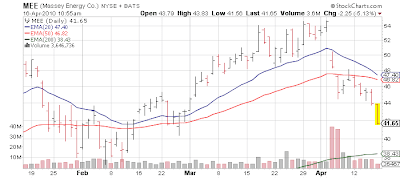Massey Energy (MEE) Still Struggling
I sold out of Massey Energy (MEE) early this week (after cutting the position in half last week), but in the comments section was an interesting question which is worth addressing since it touches on my general Investing Philosophy.
Let me preface this by saying there is no "right" way to invest. I know some people who are pure technical daytraders who know little to nothing about what they trade other than the 3 or 4 letter stock symbol. Others are deep value guys who hold 4 stocks and could write 50 pages of reasoning using more metrics that I'll ever care to know. If you can build a high frequency trading system that can outwit Goldman Sachs & RenTech - more power to you, the bank does not care how you made the money. To each their own, and for those who care to ply this trade in "do it yourself" style, I always offer the same advice. Find a system and framework that fits your personality, skill set, and time requirements. I've certainly tried everything at one point or the other since the mid 90s.
So the question posed when I sold was:
why not just make it a value play, buy more at the artificially low price and be patient?
I gave a short answer in the comments section but let me expand on it.
---------------------------------------------------
First of all I am not a 'value' investor. In my eye, a value investor believes they know something the market does not - that's essentially the whole point of that investment style. The market has mispriced a stock, and via my research I can purchase the stock at a price point where in some "time frame" (however long) I will take advantage of the mistake by the market. There are some great value investors out there but you need extreme patience and extreme conviction - it's a specific personality trait.
Next point is experience.... many times of the years I've analyzed a group of stocks in a sector and bought the cheapest - assuming the fundamentals were not much different than the peer group. I went through that in the solar space about 3 years ago. This is a commoditized business and the US offers a group of 7-8 Chinese solar companies, not *that* much different from each other. Rather than a "value" investor I am a "growth at reasonable value" investor. So I was able to buy the 2nd cheapest one at the 2nd highest growth rate. My results? Terrible. The stock continue to lag for months, and indeed quarters as many of its brethren were bid up to the stratosphere. To this day I could not explain to you why. (as an aside that stock is actually an outperformer in the group the past 9-10 months but waiting 3 years, and suffering many losses along the way is not my idea of being proven 'right' - see preceding paragraph)
Third, 'value' stocks can get 'less valuable' very easily. Once a stock breaks down technically it can fall either in price or hold your money for many months even if it goes sideways. Which means you lose opportunity cost. Rather than that money sitting in a position that might be 'cheap' but is not performing, it could be in another position that is performing. This of course assumes that the other position does better than the stock that is having issues. Which is why technical analysis is an important component to position sizing, and including or excluding a stock into a portfolio.
Which leads to relative strength in a stock. I am not speaking of the Investors Business Daily relative strength; simply a stock that is above key moving averages and has less headwinds to deal with. Why not build a portfolio full of names that have less headwinds to deal with, rather than those that are challenged? Surely, in the 'long run' some of those challenged stocks will reverse and make big returns, but how long will I need to wait? 3 months? 6 months? a decade (JDS Uniphase?!)
Of course the above framework is not perfect, bulletproof, or without exception. There is no perfect system. But just from repeated Pavlov dog repetition one notices once a stock begins to break down, the probability is it will remain weak for a while. And in the end, all these hocus pocus things we do is simply to increase the probability that a position turns out a winner rather than a loser.
No position
x
The preceding article is from one of our external contributors. It does not represent the opinion of Benzinga and has not been edited.
© 2025 Benzinga.com. Benzinga does not provide investment advice. All rights reserved.



